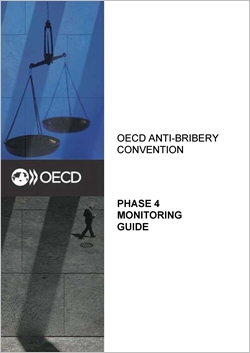Bribery in international business
Phase 4 country monitoring of the OECD Anti-Bribery Convention
|
Countries’ implementation and enforcement of the OECD Anti-Bribery Convention is monitored by the OECD Working Group on Bribery through a rigorous peer-review monitoring system. Monitoring is subject to specific agreed-upon principles and takes place in several phases. Phase 4 monitoring was launched in March 2016 and focuses on enforcement of the Convention. Overview
Phase 4 focuses on key group-wide cross-cutting issues; the progress made by Parties on weaknesses identified in previous evaluations; enforcement efforts and results; and any issues raised by changes in the domestic legislation or institutional framework of the Parties. Phase 4 endeavours to take a tailored approach, considering each country's unique situation and challenges, and reflecting positive achievements. The Monitoring Guide contains the Phase 4 procedures. Country monitoring schedule
The Phase 4 monitoring process was launched at the OECD Anti-Bribery Ministerial Meeting held in Paris on 18 March 2016. The Working Group on Bribery has established a schedule of Phase 4 evaluations from 2016 to 2024, which includes the designation of two countries to act as lead examiners in each evaluation. Monitoring schedule 2016 - 2026
OECD Anti-Bribery Ministerial Meeting
Key elements of the Phase 4 evaluation process
Involvement of private sector and civil society
When launching a new evaluation, the OECD publishes a call for written submissions on the evaluated country. This also includes a call for expressions of interest from relevant civil society and private sector representatives to participate in the on-site visit in the evaluated country. Any submissions/reports received from interested parties are shared with the Working Group on Bribery, used to inform the evaluation process, and subsequently published on the OECD website, subject to agreement from the evaluated country.
Follow-up
Following the adoption by the Working Group of the evaluation report, each evaluated country will report back to the Group in writing within 24 months of the adoption of the report, and at any other time as required by the Working Group.
Inadequate implementation of the Convention
In the event of inadequate implementation of the Convention, or where attendance at the Phase 4 on-site visit prevents the lead examiners from assessing whether a country has adequately implemented the Convention, the Working Group will consider conducting a Phase 4bis evaluation. When there is continued failure to adequately implement the Convention, further steps might be considered by the Working Group.
|
Links
OECD Anti-Bribery Ministerial Meeting
|
Related Documents
